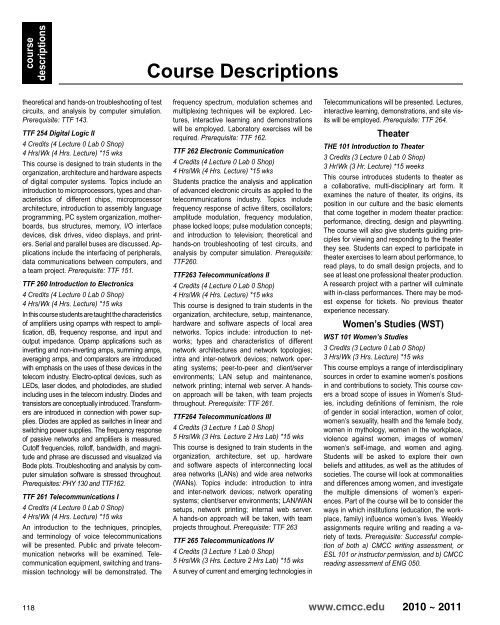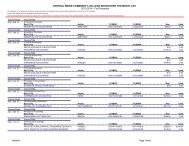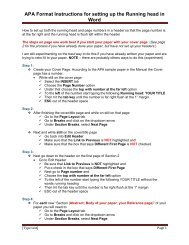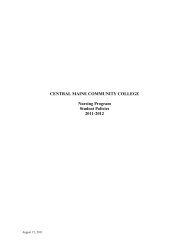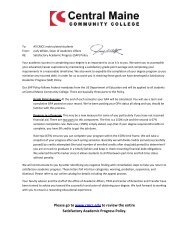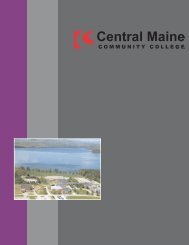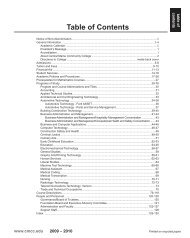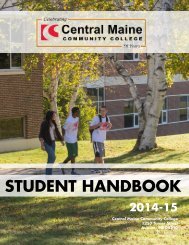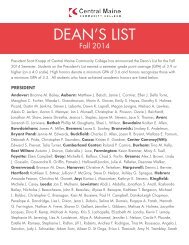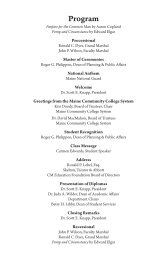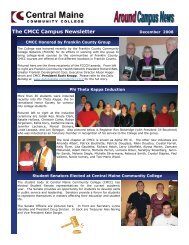Academic Policies and Procedures - Central Maine Community ...
Academic Policies and Procedures - Central Maine Community ...
Academic Policies and Procedures - Central Maine Community ...
You also want an ePaper? Increase the reach of your titles
YUMPU automatically turns print PDFs into web optimized ePapers that Google loves.
course<br />
descriptions<br />
Course Descriptions<br />
theoretical <strong>and</strong> h<strong>and</strong>s-on troubleshooting of test<br />
cir cuits, <strong>and</strong> analysis by computer simulation.<br />
Prerequisite: TTF 143.<br />
TTF 254 Digital Logic II<br />
4 Credits (4 Lecture 0 Lab 0 Shop)<br />
4 Hrs/Wk (4 Hrs. Lecture) *15 wks<br />
This course is designed to train students in the<br />
organization, architecture <strong>and</strong> hard ware aspects<br />
of digital computer systems. Topics include an<br />
introduction to micro processors, types <strong>and</strong> characteristics<br />
of different chips, microprocessor<br />
architec ture, introduction to assembly language<br />
programming, PC system organization, motherboards,<br />
bus structures, memory, I/O interface<br />
devices, disk drives, video dis plays, <strong>and</strong> printers.<br />
Serial <strong>and</strong> parallel buses are discussed. Applications<br />
include the interfacing of peripherals,<br />
data commu nications between computers, <strong>and</strong><br />
a team project. Prerequisite: TTF 151.<br />
TTF 260 Introduction to Electronics<br />
4 Credits (4 Lecture 0 Lab 0 Shop)<br />
4 Hrs/Wk (4 Hrs. Lecture) *15 wks<br />
In this course students are taught the char acteristics<br />
of amplifiers using opamps with respect to amplification,<br />
dB, frequency response, <strong>and</strong> input <strong>and</strong><br />
output imped ance. Opamp applications such as<br />
invert ing <strong>and</strong> non-inverting amps, summing amps,<br />
averaging amps, <strong>and</strong> comparators are introduced<br />
with emphasis on the uses of these devices in the<br />
telecom industry. Electro-optical devices, such as<br />
LEDs, laser diodes, <strong>and</strong> photodiodes, are studied<br />
including uses in the telecom industry. Diodes <strong>and</strong><br />
transistors are conceptually introduced. Transformers<br />
are introduced in connection with power supplies.<br />
Diodes are applied as switches in linear <strong>and</strong><br />
switching power supplies. The frequency response<br />
of passive networks <strong>and</strong> ampli fiers is measured.<br />
Cutoff frequencies, rolloff, b<strong>and</strong>width, <strong>and</strong> magnitude<br />
<strong>and</strong> phrase are discussed <strong>and</strong> visualized via<br />
Bode plots. Troubleshooting <strong>and</strong> analysis by computer<br />
simulation software is stressed throughout.<br />
Prerequisites: PHY 130 <strong>and</strong> TTF162.<br />
TTF 261 Telecommunications I<br />
4 Credits (4 Lecture 0 Lab 0 Shop)<br />
4 Hrs/Wk (4 Hrs. Lecture) *15 wks<br />
An introduction to the techniques, princi ples,<br />
<strong>and</strong> terminology of voice telecommu nications<br />
will be presented. Public <strong>and</strong> private telecommunication<br />
networks will be examined. Telecommunication<br />
equipment, switching <strong>and</strong> transmission<br />
technology will be demonstrated. The<br />
frequency spectrum, modulation schemes <strong>and</strong><br />
multiplexing tech niques will be explored. Lectures,<br />
interac tive learning <strong>and</strong> demonstrations<br />
will be employed. Laboratory exercises will be<br />
required. Prerequisite: TTF 162.<br />
TTF 262 Electronic Communication<br />
4 Credits (4 Lecture 0 Lab 0 Shop)<br />
4 Hrs/Wk (4 Hrs. Lecture) *15 wks<br />
Students practice the analysis <strong>and</strong> applica tion<br />
of advanced electronic circuits as applied to the<br />
telecommunications industry. Topics include<br />
frequency response of active filters, oscillators;<br />
amplitude modula tion, frequency modulation,<br />
phase locked loops; pulse modulation concepts;<br />
<strong>and</strong> introduction to television; theoretical <strong>and</strong><br />
h<strong>and</strong>s-on troubleshooting of test circuits, <strong>and</strong><br />
analysis by computer simulation. Pre requisite:<br />
TTF260.<br />
TTF263 Telecommunications II<br />
4 Credits (4 Lecture 0 Lab 0 Shop)<br />
4 Hrs/Wk (4 Hrs. Lecture) *15 wks<br />
This course is designed to train students in the<br />
organization, architecture, setup, main tenance,<br />
hardware <strong>and</strong> software aspects of local area<br />
networks. Topics include: intro duction to networks;<br />
types <strong>and</strong> characteris tics of different<br />
network architectures <strong>and</strong> network topologies;<br />
intra <strong>and</strong> inter-network devices; network operating<br />
systems; peer-to-peer <strong>and</strong> client/server<br />
environments; LAN setup <strong>and</strong> maintenance,<br />
network printing; internal web server. A h<strong>and</strong>son<br />
approach will be taken, with team projects<br />
throughout. Prerequisite: TTF 261.<br />
TTF264 Telecommunications III<br />
4 Credits (3 Lecture 1 Lab 0 Shop)<br />
5 Hrs/Wk (3 Hrs. Lecture 2 Hrs Lab) *15 wks<br />
This course is designed to train students in the<br />
organization, architecture, set up, hard ware<br />
<strong>and</strong> software aspects of interconnect ing local<br />
area networks (LANs) <strong>and</strong> wide area networks<br />
(WANs). Topics include: intro duction to intra<br />
<strong>and</strong> inter-network devices; network operating<br />
systems; client/server environments; LAN/WAN<br />
setups, network printing; internal web server.<br />
A h<strong>and</strong>s-on approach will be taken, with team<br />
projects throughout. Prerequisite: TTF 263<br />
TTF 265 Telecommunications IV<br />
4 Credits (3 Lecture 1 Lab 0 Shop)<br />
5 Hrs/Wk (3 Hrs. Lecture 2 Hrs Lab) *15 wks<br />
A survey of current <strong>and</strong> emerging technolo gies in<br />
Telecommunications will be present ed. Lectures,<br />
interactive learning, demonstrations, <strong>and</strong> site visits<br />
will be employed. Prerequisite: TTF 264.<br />
Theater<br />
THE 101 Introduction to Theater<br />
3 Credits (3 Lecture 0 Lab 0 Shop)<br />
3 Hr/Wk (3 Hr. Lecture) *15 weeks<br />
This course introduces students to theater as<br />
a collaborative, multi-disciplinary art form. It<br />
examines the nature of theater, its origins, its<br />
position in our culture <strong>and</strong> the basic elements<br />
that come together in modern theater practice:<br />
performance, directing, design <strong>and</strong> playwriting.<br />
The course will also give students guiding principles<br />
for viewing <strong>and</strong> responding to the theater<br />
they see. Students can expect to participate in<br />
theater exercises to learn about performance, to<br />
read plays, to do small design projects, <strong>and</strong> to<br />
see at least one professional theater production.<br />
A research project with a partner will culminate<br />
with in-class performances. There may be modest<br />
expense for tickets. No previous theater<br />
experience necessary.<br />
Women’s Studies (WST)<br />
WST 101 Women’s Studies<br />
3 Credits (3 Lecture 0 Lab 0 Shop)<br />
3 Hrs/Wk (3 Hrs. Lecture) *15 wks<br />
This course employs a range of interdisci plinary<br />
sources in order to examine women’s positions<br />
in <strong>and</strong> contributions to society. This course covers<br />
a broad scope of issues in Women’s Studies,<br />
including definitions of feminism, the role<br />
of gender in social interaction, women of color,<br />
women’s sexuality, health <strong>and</strong> the female body,<br />
women in mythology, women in the workplace,<br />
violence against women, images of women/<br />
women’s self-image, <strong>and</strong> women <strong>and</strong> aging.<br />
Students will be asked to explore their own<br />
beliefs <strong>and</strong> attitudes, as well as the attitudes of<br />
societies. The course will look at commonalities<br />
<strong>and</strong> dif ferences among women, <strong>and</strong> investigate<br />
the multiple dimensions of women’s experiences.<br />
Part of the course will be to consid er the<br />
ways in which institutions (education, the workplace,<br />
family) influence women’s lives. Weekly<br />
assignments require writing <strong>and</strong> reading a variety<br />
of texts. Prerequisite: Successful completion<br />
of both a) CMCC writing assessment, or<br />
ESL 101 or instructor permission, <strong>and</strong> b) CMCC<br />
reading assessment of ENG 050.<br />
118 www.cmcc.edu 2010 ~ 2011


